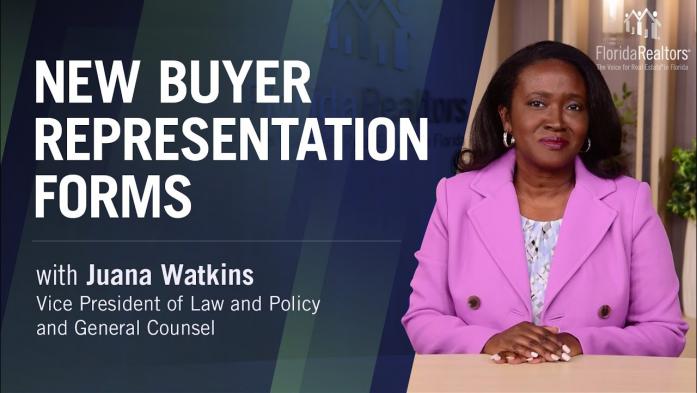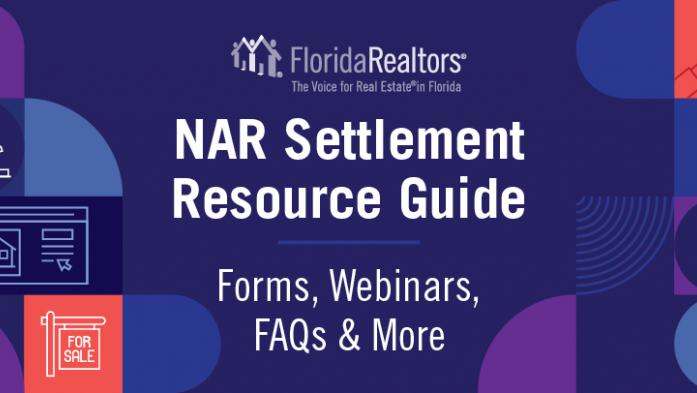
Buyer Rep Changes: How to Communicate With Buyers & Sellers
Rewriting the rules of buyer’s agent compensation is transforming how agents communicate, negotiate and demonstrate their value.
In the wake of the landmark National Association of Realtors® (NAR) settlement and the fact that offers of compensation to buyer’s agents are now excluded from the MLS, real estate professionals face the challenge of navigating a new normal. What will that look like?
Florida Realtors Releases New Compensation Forms
Starting in mid-August, all buyer’s agents are required to have a buyer representation agreement signed by the buyer. That agreement will detail how the buyer’s agent will be compensated. While the seller may continue to pay the commission, it will now require negotiation between the buyer and buyer’s agent and the listing agent and seller.
Florida Realtor® magazine spoke with several real estate coaches and agents to find out how they are moving forward and what their conversations with buyers and sellers will look like.
Polish your buyer consultations
Debbie De Grote, CEO and co-founder of Forward Coaching based in Costa Mesa, California, advises buyer’s agents to work on their buyer consultation. (
LEARN MORE: Your Foolproof Framework for Buyer & Seller Consultations
“You have to become negotiators again and counsel your buyers, demonstrate your product knowledge and explain your value,” she says. What drove her to use a buyer-broker agreement years ago was being exhausted by buyers who used her time, energy and skill, and then bought on a whim from someone else. “In their mind that agent was free to them. Agents could run out, show a house, write an offer and make money. Now, those agents need to skill up, discuss everything with their buyers, get a buyer agreement signed and be committed to working with them. Also, when a buyer signs an agreement and agrees to potentially [compensate you], they’ll want to know ‘What am I getting for my money?’”
According to De Grote, about 45% of buyers across the country have already been signing some type of agreement. “It’s not like it isn’t being done already; it’s just that it will be [an NAR requirement] and the [compensation] must be addressed. A typical conversation with a buyer could be, ‘I work for a commission of X and provide these valuable services. You decide what you’re willing, if anything, to pay a buyer’s agent. Let’s talk about how not offering some type of concession could potentially limit your traffic.’”
From the seller’s perspective, the conversation could be:
Seller: “Hey, I heard in the news I don’t have to pay a buyer’s agent commission anymore.”
Listing Agent: “The commission is negotiable, as a seller you have all the options to choose what you decide to do.”
“Sellers are smart,” says De Grote. “They know they need to compete with other sellers and make buyers want to come see their house.”
“Real estate agents are a resilient group,” she notes. The strong always survive and thrive and find new opportunities inside of changes we think are annoying and dreadful. Then we figure out, ‘Wow, this is not so bad.’ We will see an attrition in the industry for a while and then it will become the new normal.”
Craft your unique value proposition
Tim Harris and his wife, Julie, founders of Harris Real Estate Coaching, have been advising agents to have formal, signed buyer agreements for 20 years. “Agents [must] learn how to demonstrate their unique selling proposition, or USP, much in the same way that listing agents have had to do for generations. Is this hard to learn? No. Can every agent learn these skills? Yes. Those unwilling to identify their unique selling proposition won’t succeed and will likely go out of business.”
NAR Settlement: Forms, Resources, Webinars from Florida Realtors
In both their training and podcast, the Harrises encourage agents to remember their highest purpose is to be of service to others. “Get in alignment with that truth and be ready to take action,” says Tim Harris. “Focus on holding effective open houses, honing your sales skills and developing a formal presentation that explains the value proposition you have for buyers and why buyers should work with you.
“Most people don’t understand what a buyer’s agent does. You know all the intricacies of the transaction, so show them everything that goes into it, and the buyer is going to want to sign with you.
The Harrises also coach their agents to give service guarantees. For example, they advise saying, “When you buy a home with me, if you’re not 100% satisfied with the house, I’ll sell it for you within the first six months for free.”
“Agents need to get to work, stop doom scrolling, be grateful for the opportunity to formalize their buyer business and create real value for the consumer,” Julie Harris says.
Better buyer representation
Orlando-based Erika Phelan has exclusively worked with buyers since joining Buyers Broker of Florida 20 years ago. “My mom, Eve Alexander, is the broker of the family business and a pioneer for buyer agency. I enjoy working with buyers, educating them on the process and representing their interests. Orlando has been booming with new construction for decades, and I like to focus on new construction.”
As an exclusive buyer’s agent, her company is considered a single agent, not a transaction broker, in the state of Florida. “We only represent buyers,” she adds. “We have no conflict because we have no listings in our office. The state has required us, as a single agent, to provide an agreement before we show homes. That’s not new for us; it’s just a continuation of what we’ve been doing for quite some time.”
Phelan expects buyers to become more selective when choosing a buyer’s broker. “As a result, we will be beefing up our buyer presentation to clearly explain how our services differ from the transaction broker or buyer’s agent, because we aren’t in the same category,” she explains. “We will need to demonstrate our value, and I believe we can capitalize on this by showing how we can assist buyers moving forward. I don’t foresee this affecting us negatively. Instead, I anticipate that it will lead to an increase in buyer interviews and interactions on the sales front as they select their agent. I think that’s going to be more competitive.”
Phelan says that in Florida, the focus has traditionally been on seller representation. “This shift will significantly change how buyers select homes to see, who they hire and how they handle an expense they hadn’t considered before. It’s a huge change that highlights buyer representation—and a change we view as positive.”
Initiate upfront conversations
For Dan Lesniak, an eXp Realty agent who leads a team of 72 across Broward and Palm Beach counties, the way he works with buyers has largely remained the same. “We’ve been heavy on upfront buyer agreements and presentations for over a decade. So, from that perspective, a lot of these requirements aren’t new to us,” he says. “More buyers and sellers are aware of it now, though, and they’re asking more questions.”
Lesniak points out that agents will need to devote more time to explaining their fees and the various ways to get paid. “The irony of the lawsuits is they’re saying the seller shouldn’t have to pay the buyer’s agent commission, but it’s actually the buyer’s cash or money from the lender that funds everything,” he says. “I use this analogy with the team: whether it’s a square pizza or a round pizza, the buyers are the ones bringing the pizza.”
He believes this paradigm shift in the industry could benefit experienced agents. “I think the lower-skilled agents might exit the business, leaving more opportunity to gain market share for those who adapt quicker,” Lesniak says. One downside he sees is the potential pushback on agent compensation by the public. “The universal offer of cooperative compensation to a buyer’s agent was transparent. There’s a potential for commission compression, though the extent is unknown.”
Lesniak and his team have prepared for the fact that cooperative compensation is no longer published in the MLS. “Moving forward, we’ll have to call the listing agent to ask if a commission incentive is being offered,” he says. “If not, we will try to negotiate a concession from the seller as part of the offer.” Candid conversations are crucial for ensuring that everyone is on the same page. “It’s important to educate buyers upfront, with a statement like: ‘Before you write the offer, we’ll make sure you know if the listing agent isn’t covering our fee and if we need to request it from the seller directly. We’ll make sure you’re aware of any potential shortfall.’”
He sees this as an opportunity for agents to do better. “[There are a small percentage of] agents who got away with showing up, opening doors, writing offers and taking whatever cooperative compensation was listed in the MLS rather than explaining their value and the process of how they help [the buyer] and earn their fee.” With this settlement, all of that is changing, demanding real estate professionals to up their game and articulate their value. #
These 7 script ideas
- “My role as your buyer’s agent is to guide you through the entire homebuying process, from finding the right property to negotiating the best price and handling all the paperwork. My expertise and local market knowledge helps me help you make an educated decision. It also helps you save time, money and avoid difficulties you might not even be aware of.”
- “One of the critical areas where I add value is during the negotiation phase. I have years of experience negotiating property prices and conditions, and I am committed to getting you the best deal possible. This not only potentially saves you a significant amount of money but also ensures you are making a sound investment.”
- “I have extensive knowledge of this area, which includes understanding the trends of the local real estate market and insight into each neighborhood. This means I can help you find the right home faster and often at a better price than you might find on your own.”
- “Through my professional connections, I can streamline your homebuying process. From home inspectors to mortgage lenders, I connect you with trusted professionals who will make sure that every aspect of your purchase is handled with care.”
- “I believe it’s important for you to feel confident and informed at every step of your home buying journey. I will provide you with detailed explanations of each stage so there are no surprises along the way. My aim is to make the complex process of buying a home as straightforward and stress-free as possible for you.”
- “By handling all aspects of your home search and purchase, I can save you valuable time. You won’t need to sift through listings, coordinate viewings or research the required paperwork. I’ll take care of all that, so you can focus on what’s important to you.”
- "I tailor my services to suit your specific needs and preferences. Whether you need more guidance on certain aspects of the buying process or have specific constraints and requirements, I am here to listen and adapt. My priority is to find you a home that feels right in every way.”
Leslie C. Stone is a Vero Beach-based freelance writer.


